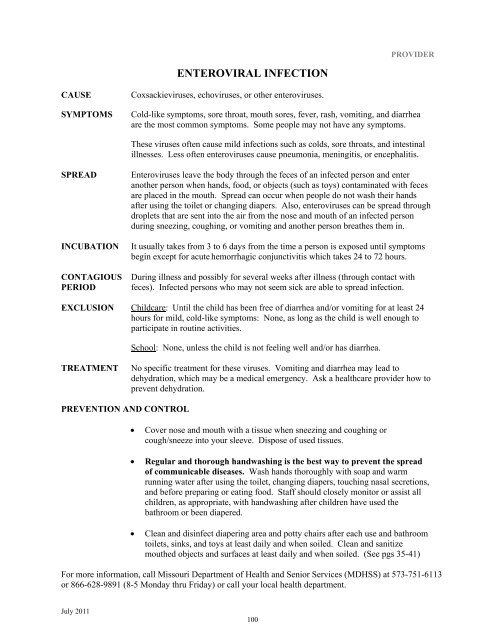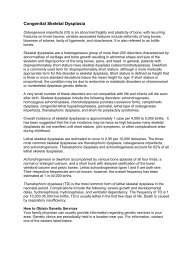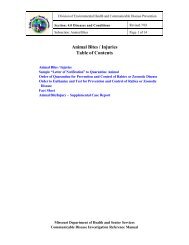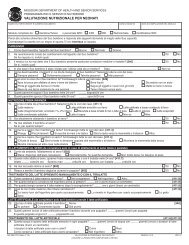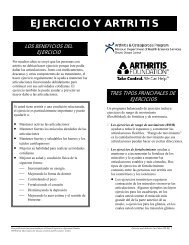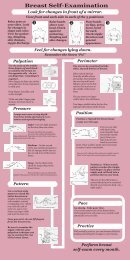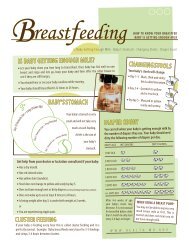Prevention and Control of Communicable Diseases - Missouri ...
Prevention and Control of Communicable Diseases - Missouri ...
Prevention and Control of Communicable Diseases - Missouri ...
Create successful ePaper yourself
Turn your PDF publications into a flip-book with our unique Google optimized e-Paper software.
July 2011<br />
ENTEROVIRAL INFECTION<br />
CAUSE Coxsackieviruses, echoviruses, or other enteroviruses.<br />
100<br />
PROVIDER<br />
SYMPTOMS Cold-like symptoms, sore throat, mouth sores, fever, rash, vomiting, <strong>and</strong> diarrhea<br />
are the most common symptoms. Some people may not have any symptoms.<br />
These viruses <strong>of</strong>ten cause mild infections such as colds, sore throats, <strong>and</strong> intestinal<br />
illnesses. Less <strong>of</strong>ten enteroviruses cause pneumonia, meningitis, or encephalitis.<br />
SPREAD Enteroviruses leave the body through the feces <strong>of</strong> an infected person <strong>and</strong> enter<br />
another person when h<strong>and</strong>s, food, or objects (such as toys) contaminated with feces<br />
are placed in the mouth. Spread can occur when people do not wash their h<strong>and</strong>s<br />
after using the toilet or changing diapers. Also, enteroviruses can be spread through<br />
droplets that are sent into the air from the nose <strong>and</strong> mouth <strong>of</strong> an infected person<br />
during sneezing, coughing, or vomiting <strong>and</strong> another person breathes them in.<br />
INCUBATION It usually takes from 3 to 6 days from the time a person is exposed until symptoms<br />
begin except for acute hemorrhagic conjunctivitis which takes 24 to 72 hours.<br />
CONTAGIOUS<br />
PERIOD<br />
During illness <strong>and</strong> possibly for several weeks after illness (through contact with<br />
feces). Infected persons who may not seem sick are able to spread infection.<br />
EXCLUSION Childcare: Until the child has been free <strong>of</strong> diarrhea <strong>and</strong>/or vomiting for at least 24<br />
hours for mild, cold-like symptoms: None, as long as the child is well enough to<br />
participate in routine activities.<br />
School: None, unless the child is not feeling well <strong>and</strong>/or has diarrhea.<br />
TREATMENT No specific treatment for these viruses. Vomiting <strong>and</strong> diarrhea may lead to<br />
dehydration, which may be a medical emergency. Ask a healthcare provider how to<br />
prevent dehydration.<br />
PREVENTION AND CONTROL<br />
� Cover nose <strong>and</strong> mouth with a tissue when sneezing <strong>and</strong> coughing or<br />
cough/sneeze into your sleeve. Dispose <strong>of</strong> used tissues.<br />
� Regular <strong>and</strong> thorough h<strong>and</strong>washing is the best way to prevent the spread<br />
<strong>of</strong> communicable diseases. Wash h<strong>and</strong>s thoroughly with soap <strong>and</strong> warm<br />
running water after using the toilet, changing diapers, touching nasal secretions,<br />
<strong>and</strong> before preparing or eating food. Staff should closely monitor or assist all<br />
children, as appropriate, with h<strong>and</strong>washing after children have used the<br />
bathroom or been diapered.<br />
� Clean <strong>and</strong> disinfect diapering area <strong>and</strong> potty chairs after each use <strong>and</strong> bathroom<br />
toilets, sinks, <strong>and</strong> toys at least daily <strong>and</strong> when soiled. Clean <strong>and</strong> sanitize<br />
mouthed objects <strong>and</strong> surfaces at least daily <strong>and</strong> when soiled. (See pgs 35-41)<br />
For more information, call <strong>Missouri</strong> Department <strong>of</strong> Health <strong>and</strong> Senior Services (MDHSS) at 573-751-6113<br />
or 866-628-9891 (8-5 Monday thru Friday) or call your local health department.


